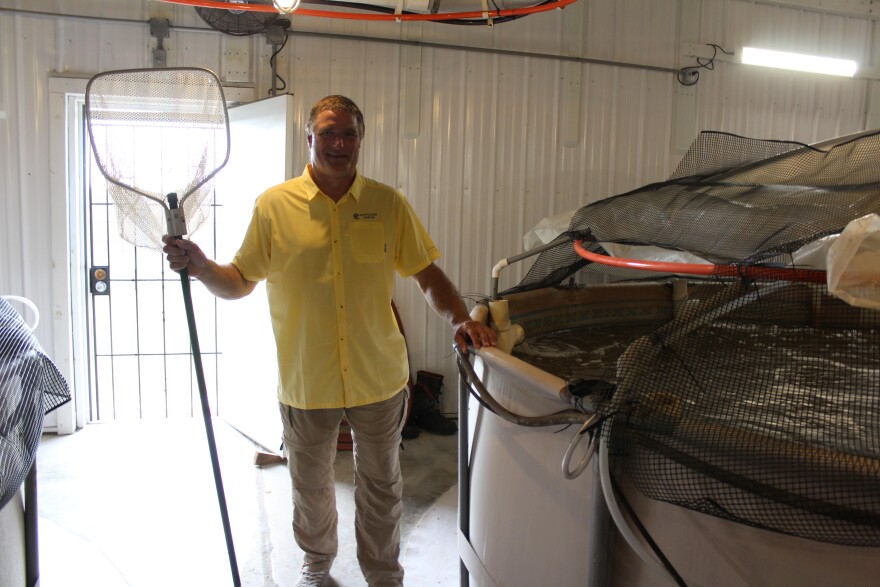When Bob Daniels started telling people he wanted to start a shrimp farm in Sumner County, the response was what you might expect.
"'You're going to sell bait, huh?'" he said laughing while recalling one comment. "In fact, when we started looking to grow the shrimp and look for some financing … the local banker said, 'Well, you're never going to sell this.'
"Now, it turns out, I can't grow it fast enough to sell what people were willing to buy."

Sunflower Shrimp in Oxford, about 40 miles from Wichita, began growing and selling Pacific white shrimp in 2016. Bob Daniels and his wife, Deb, had 1,000 customers the first year.
Despite a slow stretch caused by the pandemic — much of the business is focused on supplying restaurants — Daniels is growing a new batch of shrimp that should be ready for sale in a few months.
"Obviously this year has just come screeching to a halt, but it's one of those things that we think managed as well as we could so far," he said. "But we need to get back to selling as soon as it's safe for people to get back to the restaurants."
Daniels had farmed traditional crops for decades near Valley Center. It was his father — well-known Sedgwick County physician and coroner Robert Daniels — who first planted the idea about shrimp farming in his young son.
"My father and I were fishing, and he had pulled out some … frozen shrimp that had gone bad," Daniels remembered. "And he said, 'You know, I think we can grow shrimp.'
"I said, 'Grow shrimp? Why do you want to grow shrimp?'
"'I want to feed the world.'
"'OK. Well, how are you going to do that, Dad?'
"‘I'll leave that that to you, son.'"
What his father didn’t leave were any instructions. Shrimp farming is highly scientific — and, like regular farming, highly labor intensive. Daniels is up by 4 in the morning to feed the shrimp, the first of two feedings for the day.
It takes roughly six months from when baby shrimp arrive — they’re about the size of an eyelash — to when they grow to one ounce and are ready for sale.

Making sure the shrimp grow properly in one of the nine 3,000-gallon saltwater pools involves gathering more than 800 data points, including water and air temperature, oxygen levels and barometric pressure.
Daniels says he took a lot of chemistry and biology classes when he was a football player at Kansas State University. And he later earned a business degree at Wichita State University.
None of it prepared him for what was ahead.
"As far as the hands on and learning how to do shrimp, this was learn … on the go," Daniels said. "It's like building an airplane while you're taking off.
"You don't have a handbook at the extension office like you do for wheat or corn."

One thing he’s learned about shrimp: They don’t like earthquakes.
"They won't eat," Daniels said. "They'll go to the bottom and sit, and they won't eat for 24 hours."
They also get agitated when you turn the lights off and then turn them back on again; the building with the pools is lit 24 hours a day.
Daniels said he still plans at some point to expand the operation. He would like to add eight more buildings to his property.
There seems to be a market for it: SeafoodSource.com says the average American eats more than 4 pounds of shrimp a year, making it the country's most popular seafood. But nearly 90% of that shrimp is imported.
Daniels said his father, who died in 2012, would have enjoyed seeing Sunflower Shrimp.
"I think he’d be very happy,” Daniels said. "He (was) … never afraid to do something different.
"And he was happy when somebody tried something new and it worked."




